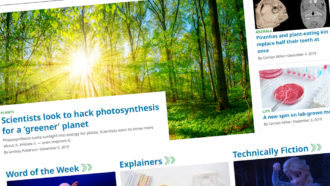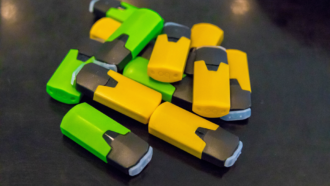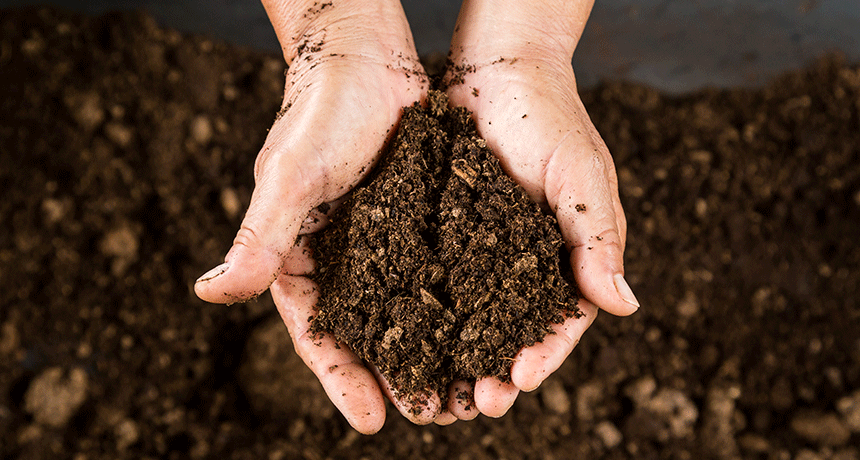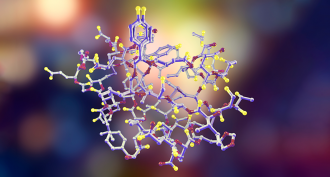
Janet Raloff
Editor, Digital, Science News Explores
Editor Janet Raloff has been a part of the Science News Media Group for more than four decades. While a staff writer at Science News, she covered the environment, toxicology, energy, science policy, agriculture and nutrition. She was among the first to give national visibility to such issues as electromagnetic pulse weaponry and hormone-mimicking pollutants, and was the first anywhere to report on the widespread tainting of streams and groundwater sources with pharmaceuticals. Her writing has won awards from the National Association of Science Writers, International Free Press Association and the Institute of Food Technologists. Over the years, Janet has been an occasional commentator on NPR's "Living on Earth" and her work has appeared in several dozen publications. She is also a founding board member of the Society of Environmental Journalists. In July 2007, while still writing for Science News, Janet took over Science News Explores (then known as Science News for Kids) as a part-time responsibility. Eventually, she expanded the magazine's depth, breadth and publication cycle. In 2013 it became her full-time job (although she still writes the occasional story for Science News). Before joining Science News, Janet was managing editor of Energy Research Reports (outside Boston), a staff writer at Chemistry (an American Chemical Society magazine) and a writer/editor for Chicago's Adler Planetarium. Initially an astronomy major, she earned undergraduate and graduate degrees from the Medill School of Journalism at Northwestern University (with an elective major in physics). She interned with the Office of Cancer Communications (NIH), Argonne National Laboratory, the Atomic Energy Commission (now Energy Department), the Oak Ridger in Tennessee and the Rock Hill Evening Herald in South Carolina.

All Stories by Janet Raloff
-
 Science & Society
Science & SocietyOur great journalism just got a new look
Finding the stories, videos, collections and more has just gotten easier.
-
 Health & Medicine
Health & MedicineToday’s nico-teen addicts: What role does ‘juuling’ play?
New data show that the most popular type of U.S. vapes deliver nicotine especially efficiently — boosting risk of addiction.
-
 Health & Medicine
Health & MedicineVaping emerges as possible trigger for seizures
Anonymous accounts have been filed with the FDA reporting seizures in teens after vaping. These were linked most often to JUUL and related pods.
-
 Health & Medicine
Health & MedicineRise in suicides emphasizes need to help teens deal with despair
Suicides are on the rise among U.S. adolescents and young adults. These data emphasize why people should reach out to friends who might have trouble coping with intense stress.
-
 Earth
EarthHoliday fireworks can bring extreme pollution, India finds
Fireworks bring sparkle and zing to a celebration, but they also can have a dark side — unhealthy levels of air pollution.
-
 Science & Society
Science & SocietyICYMI: 2018’s top science offerings
From gene-edited babies to firenados and lavanados, this year offered both stunning news and curiosities in the world of science and research.
-
 Plants
PlantsOuch! Lemons and other plants can cause a special sunburn
These are among a host of plants (many found in the refrigerator vegetable drawer) that produce chemicals that will kill skin cells when activated by sunlight. The result can be a serious, localized sunburn — sometimes with blistering.
-
 Science & Society
Science & SocietyLegendary physicist Stephen Hawking dies at 76
Theoretical research by Stephen Hawking helped shape how scientists and the public alike would come to understand black holes and other facets of astrophysics.
-
 Health & Medicine
Health & MedicineJanet’s chocolate mousse pie
The top two ingredients — dark chocolate and tofu — both have a reputation for being healthy. The good news for those who don’t like tofu: You can’t taste it in this pie. It just tastes like a very rich, thick chocolate mousse.
-
 Chemistry
ChemistryExplainer: Store receipts and BPA
The chemical BPA may become trapped in the skin, causing it to linger in the body for a week or more after touching receipt paper.
-
 Earth
EarthExplainer: What makes dirt different from soil
Although most people use the terms dirt and soil interchangeably, scientists argue that they shouldn’t. Soil has provenance — meaning history. Dirt doesn’t.
-
 Health & Medicine
Health & MedicineExplainer: What is a hormone?
Various tissues secrete special chemicals, known as hormones. They travel, usually in blood, to a particular distant site where they tell certain cells it’s time to go to work.